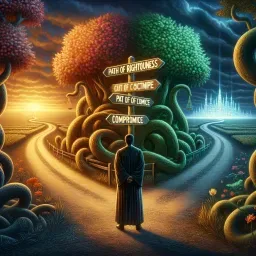I must be cruel, only to be kind

0
0
0
0
- Meaning
- Interpretively, the phrase "I must be cruel, only to be kind" conveys the paradoxical notion that sometimes harsh actions are necessary for benevolent outcomes. Hamlet says this to his mother, Queen Gertrude, implying that his harsh words and actions are meant to serve a greater good, exposing the corruptions and truths that need to be confronted. Philosophically and psychologically, this speaks to the moral complexities humans often face, where the line between cruelty and kindness can blur, necessitating difficult decisions for the greater good.
- Allegory
- The allegorical image depicts a wise king at a crossroads, symbolizing decision-making and the burdens of leadership. The two paths represent the choice between easy, possibly detrimental actions (smooth path leading to a cliff) and tough, necessary actions (rocky path). The king's sorrow and determination highlight the internal struggle of choosing cruelty for the sake of kindness. The golden light symbolizes the ultimate goodness and hope found through difficult choices. The shadowy faces represent those who will benefit from the king's choices, embodying the phrase's essence that sometimes harsh decisions bring about greater good.
- Applicability
- In personal life, this phrase can be applied in situations where tough love is needed. For instance, parents might enforce strict rules for their children's future well-being, or a friend might offer blunt advice to prevent someone from making poor decisions. It's a reminder that sometimes, short-term discomfort can lead to long-term benefits.
- Impact
- The impact of this phrase is notable throughout literature and psychology. It continues to be cited in discussions about ethics, the complexities of human relationships, and the paradoxes inherent in making difficult decisions. Its resonance in popular culture is evident in its recurrence in modern literature, film, and psychology, often used to underscore the nuanced nature of people's intentions and actions.
- Historical Context
- William Shakespeare wrote "Hamlet" between 1599 and 1601, during the Elizabethan era. This period was marked by a flourishing of English literature and drama. Shakespeare's works reflect the complexities of the human condition, and the themes of Hamlet resonate with the political and social turbulence of the time.
- Criticisms
- Criticisms of this phrase often arise from ethical debates where harsh actions in the name of kindness can be seen as justifications for authoritarian or manipulative behavior. The phrase's ambiguity can be exploited to rationalize morally dubious actions, drawing critique from those who advocate for more straightforward, compassionate approaches.
- Variations
- Variations on this theme appear in various cultures, often emphasizing the necessity of difficult decisions for the greater good. For instance, in many Eastern philosophies, the balance between yin and yang reflects the necessity of seemingly opposing forces working together to achieve harmony. Different cultures may interpret the phrase to align with their views on morality, duty, and societal harmony.
-

To weep is to make less the depth of grief.
-

There is nothing either good or bad but thinking makes it so.
-

To do a great right do a little wrong.
-

To do a great right, do a little wrong.
-

I am a man more sinned against than sinning.
-

When sorrows come, they come not single spies, but in battalions.
-

The lady doth protest too much, methinks.
-

This above all: to thine own self be true, and it must follow, as the night the day, thou canst not then be false to any man.
-

If to do were as easy as to.
-

Good night, good night! Parting is such sweet sorrow.
-

No legacy is so rich as honesty.
-

We know what we are, but not what we may be.
No Comments